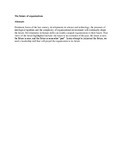| dc.contributor.author | Aila, Fredrick O. | |
| dc.contributor.author | Nyangara, Charles A. | |
| dc.contributor.author | Ojera, Patrick B. | |
| dc.contributor.author | Owaga, Eddy E. | |
| dc.contributor.author | Odera, Odhiambo | |
| dc.contributor.author | Ogutu, Martin | |
| dc.date.accessioned | 2013-05-09T08:53:43Z | |
| dc.date.available | 2013-05-09T08:53:43Z | |
| dc.date.issued | 2013-04 | |
| dc.identifier.citation | Asian Journal of Management Sciences and Education - Vol. 2. No. 2, April 2013 | en |
| dc.identifier.issn | 2186-8441 | |
| dc.identifier.issn | 2186-845X | |
| dc.identifier.uri | http://erepository.uonbi.ac.ke:8080/xmlui/handle/123456789/20670 | |
| dc.description | Full Text | en |
| dc.description.abstract | Dominant forces of the last century, developments in science and technology, the
presence of ideological rigidities and the complexity of organizational environment
will continually shape the future. Developments in human skills can readily catapult
organizations to their future. Four views of the future highlighted include: the future
is an extension of the past; the future is new; the future is now; and the future is
somewhat “past”. In our attempt to (re)invent the future, we need a leadership skill
that will propel the organization to its future. | en |
| dc.language.iso | en | en |
| dc.subject | Future organizations | en |
| dc.subject | Leadership | en |
| dc.subject | Environment | en |
| dc.title | The future of organizations | en |
| dc.title.alternative | Musings of a manager | en |
| dc.type | Article | en |
| local.publisher | School of Business, University of Nairobi | en |

